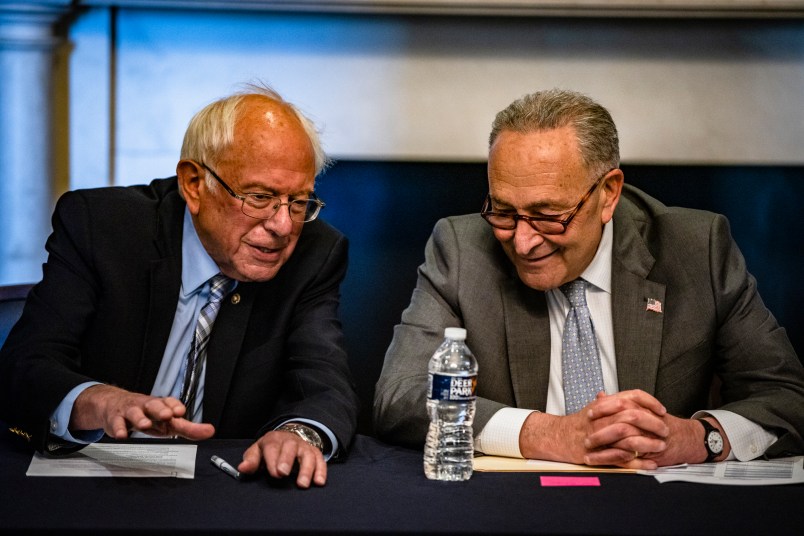Days after the big unveiling of the $3.5 trillion infrastructure budget resolution, Senate Democrats are elated.
“I think we’re all rowing in the same direction,” Sen. Elizabeth Warren (D-MA) said Thursday of moderates and progressives in the caucus.
Even now, in the very early stages of crafting the reconciliation package and prime time for lawmakers to try to jockey their policy priorities into the bill, many Democrats are prioritizing getting the package passed over personal pet issues.
“It’s very dangerous for members to make it about their bill,” Sen. Brian Schatz (D-HI) told TPM. “This is not a normal bill where it’s about ‘there’s a moving vehicle, let me see if I can get my long-standing policy hobbyhorse into the bill’ — we’re not negotiating with each other.”
When asked if there’d need to be any must-have provisions included to earn her vote, Sen. Mazie Hirono (D-HI) told TPM that “the must-have is reconciliation.”
When pressed, though, multiple Democratic senators including Schatz pinned climate change provisions — often using qualifiers like “big and bold” or “fit to meet the moment” — as their top priority.
Sen. Sheldon Whitehouse (D-RI), one of the “meet the moment” camp, added to TPM with a grin that he’s “feeling better” about the future of climate legislation since he tweeted that he was “officially very anxious” about it back in June.
But while details at this stage in crafting the reconciliation bill are still sparse, there are built-in obstacles to any climate provisions that could be considered “big and bold” or comprehensive enough to address an unfolding disaster that even this summer is scorching some regions while it floods others.
One of those obstacles is the Byrd rule, which determines what can be included in legislation passed through reconciliation. It’s meant to omit any legislation that doesn’t affect federal spending and revenues, or that produces change in spending that the Senate parliamentarian deems to be “merely incidental.” Climate provisions in the form of taxes or credits would likely sail through. But something like the clean electricity standard — part of the administration’s plan to reduce carbon emissions by 50 percent and achieve 80 percent clean energy by 2030 — is less certain.
“We have been working closely with the Department of Energy and the White House and all of the relevant committees to do our best to ensure that it will fit within the parameters of a budget reconciliation bill,” Sen. Tina Smith (D-MN) told reporters of the CES on Wednesday, according to E&E News.
The Senate parliamentarian may come into play at that point, as she delivers her verdict on whether a proposal violates the Byrd rule and has to drop out of the reconciliation package. So far, Democrats have taken her rulings — including a controversial one on a federal minimum wage hike — on spec, though she’s technically only operating in an advisory capacity and could be overruled by Vice President Kamala Harris.
“You can draft something that ramps down emissions or incentives to ramp down emissions through the use of a tax credit, or other things largely like what Biden is talking about now,” Rich Gold, an energy and environment lobbyist and a former Senate advisor and lawyer at the EPA told TPM in a recent interview. “But the clean electricity standard? I don’t see that fitting within reconciliation.”
The convoluted Senate reconciliation process may complicate climate goals in another way. The budget resolution, when written, will establish topline numbers which the pertinent committees will then break down into specific legislative language. That gives the chairs of certain committees significant power.
The chair of the Senate energy committee, likely to handle much of the climate-related part of the package? Sen. Joe Manchin (D-WV), who hails from a state proud of its history of coal production and has already previewed trouble he may cause down the road.
“I’m concerned also about maintaining the energy independence the United States of America has,” he told reporters Wednesday after talking with President Joe Biden at a lunch. “And with that you cannot be moving towards eliminating fossil, you should be innovating and using more technology, and we should be leading the rest of the world in the technology that you can use all of the above energy sources, and I told him that I was concerned about some of the language I’ve seen that moves away from fossil.”
It’s a long road to reconciliation, and some Democratic optimism may be a byproduct of even just getting a topline hammered out in a caucus that contains both Manchin and Sen. Bernie Sanders (I-VT). But obstacles loom for lawmakers hoping for climate policy like this country has never seen.
“We have to meet the moment with historic investment in clean energy, transit and transportation — accelerate the transition away from fossil fuels to renewable sources of energy,” Sen. Jon Ossoff (D-GA) told TPM. “This is a once in a generation opportunity.”



